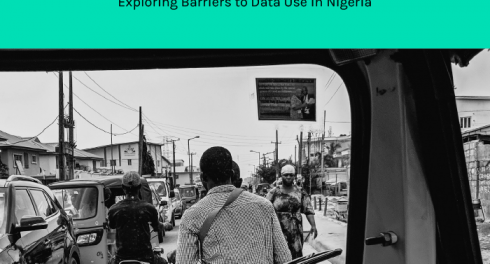Highlights
- SLAPP, beat, arrest
- Seoul searching
- Falling further behind
- Natural advantage?
- Adaptation – funder and grantee style
- AI ethics – the search continues
- TAI Spotlight: The politics of transparency and accountability
SLAPP, beat, arrest
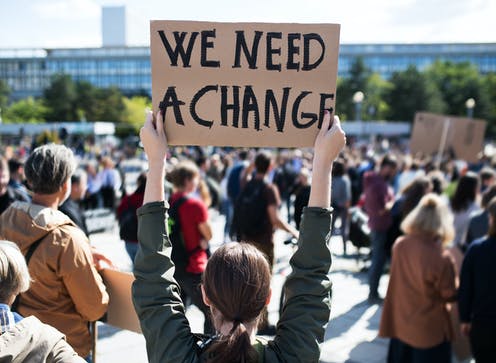
Photo Credit: Shutterstock via The Conversation
We start this week with media. Raphael Tsavkko Garcia warns that the proliferation of “both sides journalism” has given credibility to harmful racist, anti-science, and anti-democratic narratives in Brazil. Yet, those who take a stance face all too real risks. The One Free Press Coalition and WIRED spotlight journalists under attack. This month’s “10 Most Urgent” list of press freedom abuses focuses on cases relating to Covid-19, as thousands of individuals have called on the UN to work to free jailed journalists amid the ongoing pandemic.
Meanwhile, a coalition of sixty civil society organizations, coordinated by Liberties, has put together a proposal for an EU anti-SLAPP (Strategic Lawsuits Against Public Participation (SLAPP)) law that contains strong rules to protect journalists and public watchdogs from gag lawsuits. Staying with legal fights, France saw protests against the Loi Sécurité Globale, which criminalizes filming of police forces in France. Parliamentarians say Article 24 of the bill will be rewritten following nation-wide outrage over a vicious police assault on a black man. A proposed rewrite of the controversial law is welcomed by the organization Reporters Without Borders, but they maintain more work is necessary to ensure that journalists can report freely.
Meanwhile, the Belarusian opposition is compiling a list of alleged police abuses against protesters as Canadian civil society groups have called for legislation to address environmental racism.
Essential Listening: Understanding the #EndSARS Protests, Part 1: Anti-Corruption and Political Power in Nigeria
Check out the latest “Declarations” Human Rights podcast from Cambridge University in partnership with Global Integrity. Speakers Dr. Jackie Harvey and Dr. Pallavi Roy discuss the structures of political power in Nigeria and the underlying systems of corruption that culminated in the #EndSARS movement against police brutality.
Seoul searching
The value of journalists being free to do their jobs is show in the latest investigation with political repercussions in Kenya – this time taking advantage of beneficial ownership information to reveal concerns in sports betting.
The United States is particularly vulnerable to grand corruption cases, prompting Clark Gascoigne to look at opportunities for the incoming Biden-Harris administration to advance human rights through transparency and anti-money laundering reforms as George Ingram and Sally Paxton call for improved transparency of the U.S.’s of Development Finance Corporations’ data.
M Emilia Berazategui takes a sweeping look at anti-corruption takeaways from the 2020 G20 process and finds little to lack of ambition on gender and corruption and concrete steps and a clear timeline for turning their plans into actions.
The National Endowment for Democracy’s assesses the corrosive effects of Russian strategic corruption efforts in Argentina and Bolivia, while the OECD offers a model for audit institutions to assess multi-level governance and explores governance models for stronger collaboration among the courts of accounts in Brazil.
Check out OECD’s Tax Crime Investigation Maturity Model – an essential tool for measuring the impact of tax crime capacity building interventions and a self-assessment exercise for financial crime enforcement authorities. Pair with Global Financial Integrity’s GFTrade, an API tool financial institutions can integrate in their systems to better detect trade misinvoicing and cut down on fraud.
U4 Anti-corruption Research Centre unpacks the risk of corruption in humanitarian responses with a new brief detailing how a call center set up by refugees and aid providers highlight downward accountability between recipients and aid providers.
Finally, kudos to anyone who managed to attend even 10% of the 130+ sessions at last week’s International Anti-Corruption Conference. Want a snippet of inspiration? Read the Seoul Declaration that lays out a vision of a world built on trust, truth, and transparency.
Falling further behind
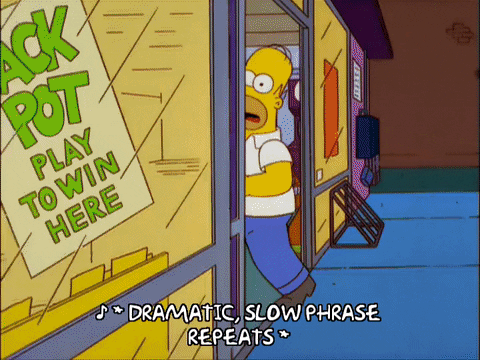
The OECD projects 4.2% growth of the global economy in 2021 but says it depends heavily on the timeline of vaccine roll-out. However, any prospective rebound will not be shared equally between countries. Cristian Alonso, Siddharth Kothari, and Sidra Rehman point to the risk of new technologies like artificial intelligence, machine learning, robotics, and big data, which widen the gap between rich and developing nations while the United Nations Office for the Coordination of Humanitarian Affairs says anticipated humanitarian needs for 2021 are the bleakest and darkest ever presented.
The disadvantaged are falling further behind within countries as well as across them. Ella Hopkins notes that G20 resistance to debt cancellation and the choice to launch the Debt Service Suspension Initiative further widens the economic gender gap, and most adversely for women in the Global South. The latter have filled financial gaps created by the pandemic with unpaid and underpaid work. The Institute of Development Studies research team sheds light on the harmful impact of COVID-19 on people with disabilities in the current labor market, while a position paper by Jordan Labor Watch raises concern about the increase in child labor in Jordan due to COVID-19. Hard to imagine they are the only country to see that worrying trend.
In a sign of some response, a wave of labor-related protests spread across 15 countreis as Amazon workers, trade unions, and climate activists staged Black Friday protests to demand worker protection, improved sustainability, and tax compliance. Over 250 million farmers and workers also held a nationwide strike against labor laws and policies viewed as anti-worker.
Andrew J. Hoffman argues we need to focus on the erosion of barriers between business and democratic institutions that gives corporates outsized influence and prevents individual donations from having much impact. He proposes upholding the principles of the “Davos Manifesto” crafted by top business and political leaders at the World Economic Forum as a better way to benefit society –ensuring corporations pay their “fair share of taxes” and serve as “stewards of the environmental and material universe for future generations.” Key lessons on how such taxes can offer practical solutions to reduce poverty are in the recent Tax Justice Network new book.
A little over half of Swiss voters favored the Responsible Business Initiative referendum to hold companies liable for global rights and environmental abuses in their supply chain. Yet it still fell short of a cantonal majority (a requirement for popular initiatives). Passage of the referendum could have been the start of more accountability for some of the world’s wealthiest companies headquartered in Switzerland, ensuring that ethical and fair business is not just an empty phrase but also a genuine commitment.
Natural advantage?
During such turbulent times, the extractive industries sector can be beneficial in rebuilding Latin American economies heavily affected by COVID-19 according to the Inter-American Dialogue, while Matilda Moyo urges African countries to exercise ownership over natural resource management to finance their development and crack down on illicit flows, including through engagement in the High-Level Panel on International Financial Accountability, Transparency and Integrity for Achieving the 2030 Agenda.
One challenge is how to square resource development with climate change mitigation. Glen Tyler-Davies and Trusha Reddy give an overview of renewable energy projects’ environmental and social impacts and how they can benefit Africa, while this new Mine Site Assessment tool can help raise awareness about the basics of responsible mining, including environmental impacts.
Governance risks also multiply with natural resource investment. Daniel Haberly and Valentina Gullo find that natural resource rents and development assistance inflows are major drivers of creation of offshore shell companies. To combat natural resource corruption, Indonesia’s Corruption Eradication Commission is making an effort to address grievances and review poor governance methods. Laode M. Syarif urges attention to governance, especially around licensing, supervision, and the enforcement of laws.
Attention to politic factors is also key to understanding the impact of efforts to achieve transparency in the extractive industries. A new Plus Politics brief illustrates how political realities shape extractive industries’ ultimate trajectory of transparency efforts (see more under TAI Spotlight).
Adaptation – funder and grantee style
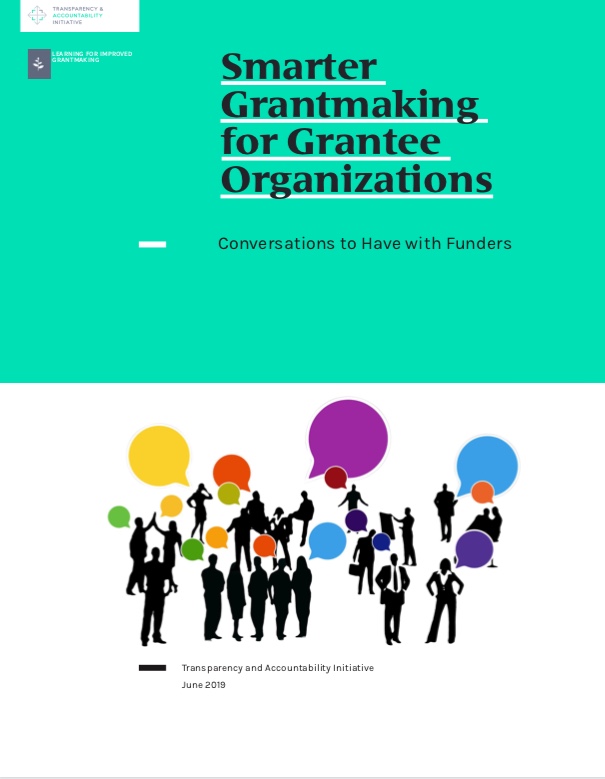
A good time to read TAI’s smarter grantmaking report
Erica Mills Barnhart also explains how nonprofits are holding up amid the COVID-19 pandemic, the economic distress caused, and what individuals, foundations, businesses, and the government can do to help. With a view from the accountability field, Cheri-Leigh Erasmus details examples of the need to innovate and adapt amid these challenging circumstances.
As funders and grant seekers alike identify new priorities and face budget constraints, it could be useful to check out this INTRAC resource on what responsible “exit” can look like for partners and communities who remain. They have also provided different global perspectives on ways funders can decolonize capacity strengthening as they build back better.
Five funders who support organizational development also share key insights, including how to describe a standard organizational development process, as well as on-going dilemmas funders faced and how to address them.
This Gender Lens Investing Landscape report by Sasakawa Peace Foundation, in collaboration with Sagana and Catalyst at Large, explores the rise of Gender Lens Investing (GLI), particularly in East and Southeast Asia. They note that while the definition and scale of gender lens investing have significantly expanded during the pandemic, women in top executive and board positions remain low across sectors and geographies.
Max Hardy invites us to re-imagine stakeholder mapping, break free from assumptions, and hopefully look beyond the usual suspect.
Meanwhile, the USAID is taking “unprecedented” steps to prepare for future crises with scenario planning exercise involving 75 USAID development experts and creating a strategic foresight unit. Would be interesting to know if any organizations that had such units pre-pandemic proved to be better prepared. Certainly, many aid agencies are facing major shakeups. Listen to Clare Short, first cabinet-level Secretary of State for the Department of International Development discuss the “demise” of the department she led.
On the philanthropic front, Digital Freedom Fund announce plan to revise their grantmaking process ahead of another grantmaking cycle next year, while you may want to review the first virtual WINGSForum about power and philanthropy’s role and the new website for the network of 170 grantmaking organizations.
AI ethics – the search continues
TAI was glad to be part of discussions on innovating AI governance last Friday. This against the backdrop of Google again being under the spotlight – this time over the controversial departure of Timnit Gebru – ethical AI researcher.
Janet Haven and Danah Boyd reflect on philanthropy’s techno facism problem and propose four ways that philanthropy can use technology to rebuild democracy. Similarly, Ashley Nancy Reynolds hopes technology companies will prioritize the need and experience of rightsholders and ensure that the product they develop contributes to a better, more open world.
Finally, dig into Salome Viljoen’s paper on a new way to think about data governance and regulation. Worth the read.
TPA Disclosure Series: Amina Salihu talks accountability and inclusiveness in civil society
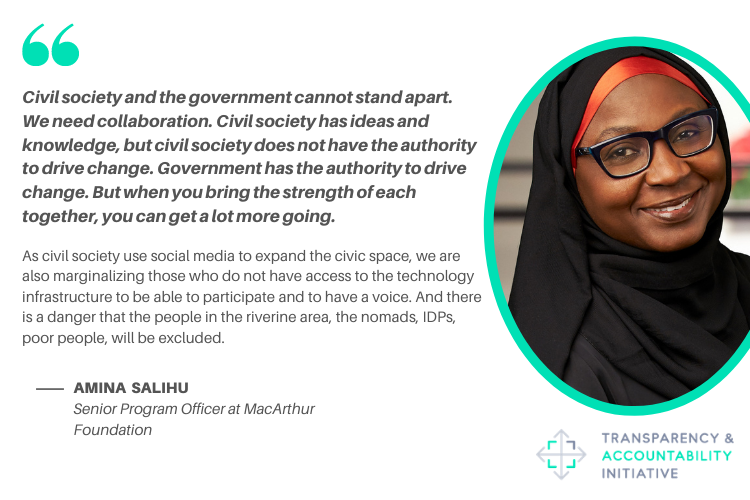
Senior Program Manager at the MacArthur Foundation, Amina Salihu, has been working on Transparency, Civic participation, and Accountability (TPA) issues for almost 30 years. What are the changes in the field over the years and how can TPA pundits be better partners with the society they seek to serve and influence? Find out in our interview with Amina as we discuss grantee, funder, and civil society role and future in the TPA space.
TAI Spotlight: The politics of transparency and accountability
It’s all about the politics… | Transparency and Accountability Initiative
Can more attention to political dimensions lead to more impact from disclosures? Read this discussion paper from Leila Kazemi of the Columbia Center on Sustainable Investment and Transparency and Accountability Initiative’s Executive Director, Michael Jarvis and on why it’s important to think and work in more politically informed ways on extractive industries transparency and how practitioners can begin to do this.
Philanthropic support for the Headway initiative |Ford Foundation and Hewlett Foundation
In partnership with Stavros Niarchos Foundation, Ford Foundation and Hewlett Foundation will fund New York Times’ three-year journalism initiative, Headway, to strengthen local journalism and make deeply reported pieces that present solutions publicly available. Headway will produce 10-12 “deeply researched, visually ambitious, data-rich” investigations on global and national challenges per year.
Measuring perceptions of democracy in Latin America during COVID-19 | Luminate
How does COVID-19 impact the perception of democracy in Latin America? Find out in this newly published research which measures 26,000 responses favorability towards democracy, satisfaction with leaders’ responses to the COVID-19 crisis, and trust in information sources, among other areas.
Change at the top and Now is the time for climate action | Open Society Foundations
Patrick Gaspard is to step down as President of Open Society Foundations at the end of the calendar year and be replaced by Mark Malloch-Brown, former number two at the UN, on January 1st. Karim Harris, policy analyst, says that while misinformation remains a serious threat to climate justice, there is enough public will to embrace climate reforms. Rather than wait for 100 percent of the public to be onboard, policymakers and advocates alike should seize this moment and push for strong climate action.
Job Listing
- Policy and communications officer at CORE Coalition – December 17, 2020
- Professor of international human rights law at The Fletcher School of Law & Diplomacy – December 18, 2020
- Policy consultant at Accountability Counsel – Ongoing
- Government Affairs Senior Policy Advisor, International Financial Institutions at Oxfam – Ongoing
- Data Architect at Open Data Institute – Ongoing
- Luminate Director, Africa – Ongoing
- Job postings at Hewlett Foundation – Ongoing
- Job postings at MacArthur Foundation – Ongoing
- Job postings at Open Society Foundations – Ongoing
- Job postings at Luminate – Ongoing
- Job postings at Ford Foundation – Ongoing
- Senior Policy Advisor for Civic Space at Oxfam America – Ongoing
Call/ Opportunities
- World Justice Challenge 2021 – December 11, 2020
- Climate change and COP26 – Open call for creative commissions – December 13, 2020
- Governance and the COVID-19 Pandemic in the Global South, EGAP – December 15, 2020
- European Commission public consultation on criteria defining environmentally sustainable activities – December 18, 2020
- European Commission public consultation on sustainable corporate governance initiative – February 8, 2021.
- The RightsCon call for proposals – January 19, 2021
- I-RAnT! Nigeria Influencing Grant – February 7, 2021
- Call for submissions to SSIR Series: Social change in an era of extreme polarization – Last Thursday of every month until early 2021
- USAID’s Development Innovation Ventures (DIV) grant funding – Ongoing
- BetterTogether Challenge for innovators – Ongoing
- Call for research proposals Tax and civil society – No Deadline
- Free Digital Security Training – Ongoing
- Open Road Alliance Charitable Grant and Loan to organizations responding directly to COVID-19 – Ongoing
- Pulitzer Center Coronavirus news collaboration challenge – Applications will be reviewed on a first-come, rolling basis
- Call for proposals: Informality, tax, and the state – Proposals accepted on a rolling basis
Calendar
- New approaches to anti-corruption: Four ignite talks – December 8, 2020 (9am EST)
- Tech for Integrity: International Anti-Corruption Day – December 9, 2020 (1:00pm – 2:00pm ET)
- CoST Webinar: Launch of the infrastructure transparency index – December 9, 2020 (1pm – 2.15pm GMT)
- Webinar on the state of corruption in America with Sarah Chayes – December 9, 2020 (12:00 PM EST)
- Corruption & Climate change interventions: Understanding the problem – December 10, 2020 (12:30pm in Stockholm)
- Tax for Development webinar series –December 15, 2020 (15:00 – 16:00 CET)
- Getting it right: Promoting equity and accountability in the COVID response – December 16, 2020 (8am EST)
- 2021 Data on Purpose conference – February 17-18, 2021
- International Open Data Conference – Postponed till 2021
